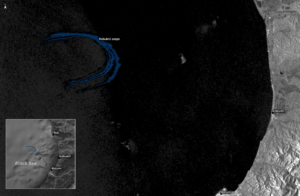9th November 2021
Event Information
Speakers: Professor Stuart Marsh & Cristina Vrinceanu – University of Nottingham
Topic: Earth Observation and Beyond
Abstract:
Earth Observation (EO) has been applied to the oil and gas industry for decades. At the outset, this was typically done in onshore exploration, though if one counts various geophysical datasets as a form of remote sensing then one can extend this to the offshore environment as well. There have been many applications of remote sensing to structural analysis, identifying potential traps, as well as to the analysis of sedimentary units associated with the generation of hydrocarbons. This field can now be considered mature. The cutting edge has moved on to consider more environmental aspects, such as the detection of gasses associated with oil storage and oil and gas seeps in the field. This talk will focus on the use of EO to observe natural emissions that help identify potential hydrocarbon resources in the subsurface, but that can also be used to pinpoint accidental or systematic pollution events caused by land or maritime activities.
Offshore, Kvenvolden and Cooper, (2003) suggest that 47% of the total crude oil currently entering our oceans is from natural oil seeps whilst the remaining 53% is a consequence of our marine or land activities. Although outdated, these figures portray the dimension of our impact on the marine environment, as well as the resources we could potentially access. Detecting these oil pollution incidents or emissions implies the continuous scanning of vast areas of the ocean, a task impossible to do with ground resources alone, but achievable with an eye in the sky; satellite data is now helping monitor our oceans in a consistent manner. Synthetic Aperture Radar sensors, which are traditionally used in marine studies due to their daylight and weather independency, cover large ocean swaths. Changes in grey levels on a SAR image point to variable signal backscatter return, which translate into various meteo-ocean phenomena, including the presence of oil slicks. Optical sensors in both multispectral and hyperspectral configurations are weather dependent but, unlike SAR, they help discriminate between oil slicks and other surfactants by understanding the spectral signatures of various substances covering the sea surface. Furthermore, radiometric and scatterometric information can be exploited to understand various biogeochemical and physical properties of the marine surface; these include temperature, velocity, or biogenic content. This in turn contributes to providing a more complete picture of the setting, transport and behaviour of hydrocarbon in the ocean.
In this talk, we will analyse the example of natural oil emissions in the Black Sea from the perspective of the synergetic exploitation of Earth Observation datasets using various automation algorithms such as classical semi-automatic classification or machine learning or newer convolutional neural networks and visual transformers. As the Energy and Earth Observation sectors evolve, understanding how to combine geoscience knowledge with modern computational techniques and satellite data to detect hydrocarbon signatures more reliably will help us map pollution events, optimise workflows, reduce operational costs and ultimately exploit our resources more sustainably.

Satellite image of oil slick in the Black Sea. Contains modified Copernicus Sentinel-1 imagery (EU/ESA)

Speaker Biographies
Professor Stuart Marsh – University of Nottingham
Professor Stuart Marsh is the Director of the Nottingham Geospatial Institute. He worked for the British Geological Survey developing EO applications to geoscience problems for 22 years, before taking his Chair in the University. He now guides a cohort of 24 PhD students in the Institute, including 10 in the new EPSRC Centre for Doctoral Training run jointly with Newcastle University.
Cristina Vrinceanu – University of Nottingham
Cristina Vrinceanu is one of Professor Stuart Marsh’s PhD students working on the use of EO in hydrocarbon exploration and management. She completed an internship with the European Space Agency before starting her PhD and is now in the early stages of writing up her thesis.
Sponsor
This event is kindly hosted by:

Venue Information
Venue information
Venue name:
Online
Venue address:
This event will be delivered online.

